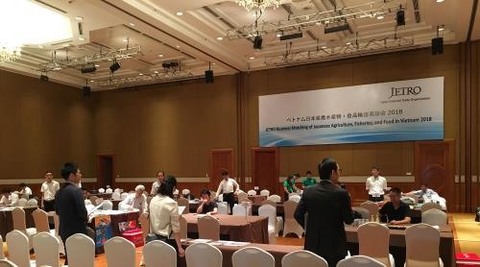
Japanese and Vietnamese companies had a chance to connect and discuss co-operation opportunities in food, agriculture and fishery sectors at a meeting on Thursday in Ha Noi.— Photo bnews.vn
Japanese and Vietnamese companies had a chance to connect and discuss co-operation opportunities in food, agriculture and fishery sectors at a meeting on Thursday in Ha Noi.
The meeting was organised by the Japan External Trade Organisation (JETRO) with the participation of 32 Japanese firms and a total of 300 Vietnamese companies. The first part of the event was held in HCM City on Wednesday.
According to Japan’s Ministry of Finance, export turnover of agriculture, fishery and food products from Japan to Viet Nam reached 39.5 billion yen in 2017 and Viet Nam replaced Thailand as Japan’s sixth largest export market. Meanwhile, total Japanese exports to Viet Nam in the first five months of 2018 increased by 24.8 per cent year on year.
In recent years, a large population, economic growth and raising awareness of food hygiene have made Vietnamese consumers pay more attention to food safety and increased their demand for clean food products imported from Japan.
According to Hironobu Kitagawa, Chief Representative of JETRO Office in Ha Noi, the Vietnamese market has high potential and is able to expand in the future and Vietnamese consumers have high confidence in Japanese products for their quality and high standards.
The three types of products that are favoured by Vietnamese consumers are food and supplementary products, seafood products, confectioneries and baby products, he said during an interview at the event.
“Japan has high standards for clean products. We are confident that our products are able to enter the Vietnamese market, and of course, they meet the requirements of the local authorities and consumers.”
The event was an opportunity for businesses from the two countries to meet and exchange ideas and knowledge, leading to good co-operation in the future, Hironobu said.
“We always make our best efforts to arrange the programmes and activities and expect this event to open new opportunities for both Vietnamese and Japanese companies,” he said.
The prospects of co-operation between Vietnamese and Japanese firms were also the biggest concern for both sides at the event.
“We have sold our products in some of the countries and territories in the region such as Hong Kong, Taiwan and Singapore. We have not gained a large number of customers in Viet Nam, but we do feel the market here will grow and account for a large part of our plan in the next 10-20 years,” Yasushi Oruga, chief of overseas sales at Misaki Megumi Suisan Co Ltd, told Viet Nam News.
There are both challenges and opportunities for us when doing business in Viet Nam, he said, adding it was quite difficult to complete required paperwork for import-export procedures.
Meanwhile, the advantage for Japanese food companies is Viet Nam’s young population and young consumers who tend to favour Japanese food more than other countries, Yasushi said.
Nguyen Thi Phuong, director of Adhome Thinh Vuong Co Ltd, said her company has partnered with four Japanese firms in the last three years since the firm started working with JETRO as part of its connection programme. Adhome Thinh Vuong has become the sole product distributor in Viet Nam for those Japanese firms.
Normally, JETRO helps connect Vietnamese and Japanese firms, then the firms will work independently with each other, she said. “JETRO will provide support for the two sides whenever there are issues with administrative paperwork and logistics.”
Japanese firms are also well-known for their professionalism with high-quality after-sale services, which follow their customers closely and respond to their complaints as quick as possible, Phuong said.
She said Vietnamese firms could take advantage of this event to discuss, share and learn experiences from the Japanese to improve their business performances. — VNS